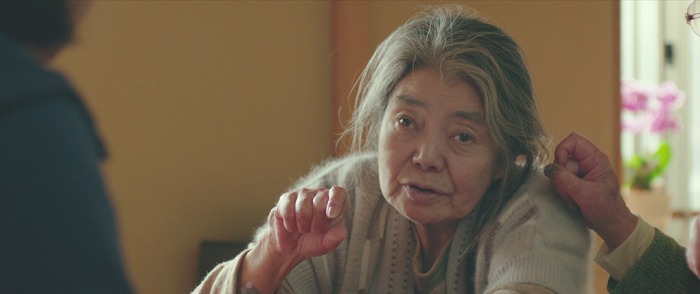
Kirin Kiki in Naomi Kawase’s An (Sweet Bean).
Loneliness, especially urban loneliness, may no longer seem like an original subject for small-scale dramas. But loneliness in contemporary Tokyo frequently has a hard edge to it, a sense that it’s a lot more difficult to escape than elsewhere in the world. There’s the ease of being stigmatized–by illness, poverty, or just existing slightly outside of normal–and the fact that once you’re stigmatized, the stain never seems to go away. There’s an infrastructure of school, cram school, work, and family relations that doesn’t have much room for those who don’t belong to most of those groups. Sometimes isolation happens via vicious cruelty, as with Japan’s many documented cases of ijime (bullying) by both children and adults. But sometimes people just fall through the cracks.
Naomi Kawase’s An (Sweet Bean) is the story of three such social outcasts who come together through a local sweet shop. Sentaro (Masatoshi Nagase) runs the small shop selling dorayaki, the traditional Japanese sweet made of small vanilla pancakes stuffed with sweet red bean paste. He’s reserved but not cold, though we get the sense early on that he’s hiding some pain. Wakana (Kyara Uchida) is a serious-faced junior high school student with a disinterested mother who frequents the shop and subsists partially on the leftover dorayaki that Sentaro gives her at the end of each day. Wakana has friends, but they’re off to cram school and eventually high school, something Wakana’s mother doesn’t see the point of. The friends aren’t cruel to Wakana because of this, but we can sense their paths are going to diverge.
Into this world comes the 76-year-old Tokue, played with great warmth and sensitivity by the always-wonderful Kirin Kiki (the real-life grandmother of Uchida). She is polite but persistent–she wants to work in the shop, and she’s practically willing to do it for free. She smiles with absolute glee at everything around her as if she’s seeing it for the first time. She’s childlike, but not the least bit senile.
She is also profoundly beautiful, something that didn’t necessarily come through in Kiki’s previous performances in films like Still Walking and Like Father, Like Son. There’s a luminous quality to her eyes and her smile, and a director like Kawase, always so skilled at imbuing everyday people and things with great beauty, knows just how to capture it.
Sentaro is reluctant at first, but then he tastes Tokue’s homemade bean paste, and with some encouragement from Wakana, allows Tokue to start working in the shop. Not surprisingly, the new dorayaki are a huge hit in the neighborhood, Tokue is ecstatic, and Sentaro seems to thaw a bit.
But we’re only about a half hour into the movie, and soon we learn more about why Tokue has been living in isolation for most of her life, as well as more clues about Sentaro’s past. Nothing that happens next is especially surprising, but Sweet Bean mostly avoids the overtly sentimental pitfalls of a story about outsiders and triumph over adversity.
With its much more conventional narrative and framework, though, the film is still likely to be a disappointment for fans of Kawase’s stripped-down, documentary-style films that have made her a darling of international film festivals. Sweet Bean marks the first time that she’s adapted someone else’s work (Kawase’s screenplay is based on a novel by Durian Sukegawa), and it’s also her first film set in Tokyo. Though everything looks considerably shinier than in her previous films, the pieces don’t always quite fit together, and some of the plot threads are forgotten. We never quite get a sense of what will happen to Wakana, who at one point says she’s running away from home but then is pictured back in her school uniform. A new character is introduced near the end of the film but then seems to disappear.
Still, when Sweet Bean works, it works beautifully, and it’s at its best when the focus is on Tokue and the little details of everyday life that she–and Kawase–find so much joy in. There’s a scene near the end of the film in which Tokue, in a heartbreakingly matter-of-fact tone, tells a story from her childhood. The camera stays focused on her for a very long time, the sun shining in through the window on her face, the occasional tear betraying emotions that she has clearly spent a lifetime not showing. It’s wrenching, and it achieves the effect, thankfully, without the histrionics that seem to be de rigeur for so many contemporary Japanese dramas.
In terms of filmmaking craft and story, nothing really groundbreaking happens in Sweet Bean, and its narrative could use a little polishing around the edges. But while many may bemoan Kawase’s move toward more conventional filmmaking, her talent and particular eye for detail still shine through. The authenticity of the performances that she coaxes from the actors, as well as the way that Sweet Bean allows us to see the world through Tokue’s endlessly exuberant gaze, make it a more than worthwhile viewing experience.
I recently saw this movie – really beautiful!
LikeLike